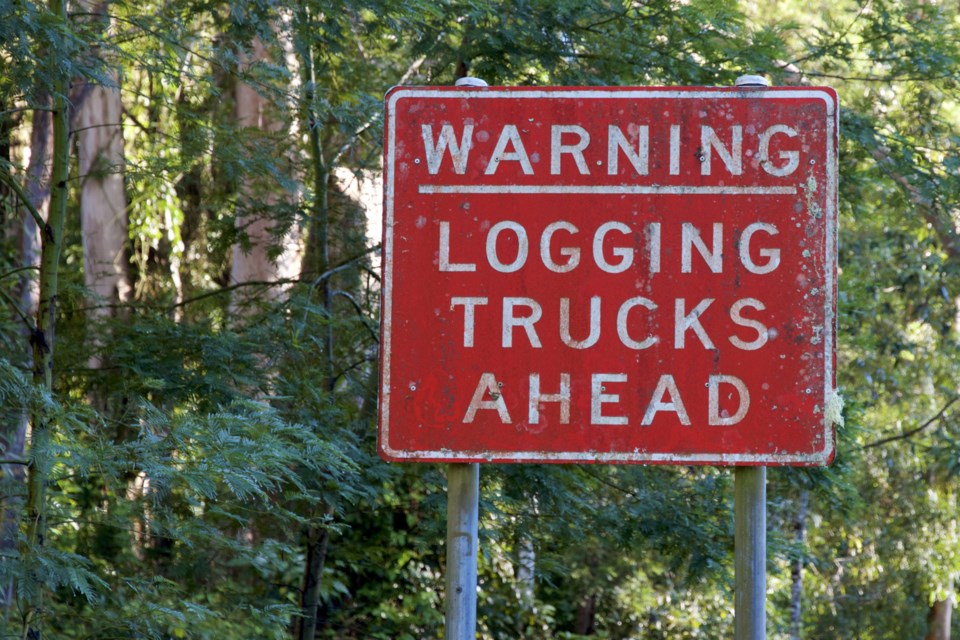“It’s a big hole and someone needs to send us a rope and ladder to get us out of it.”
The desperate appeal from David Elstone, outgoing Executive Director of British Columbia’s Truck Loggers Association (TLA) as he describes a near hopeless outlook among many of his organization’s 500 members as they gather in Vancouver for their annual convention January 15-17.
While much has been reported over the past year about the dire situation facing BC sawmill workers, the current downturn in the forest industry is equally as painful for the men and women who work deep in the forest as loggers, contractors, truck drivers and suppliers.
“Lives are being destroyed,” says Elstone as he explains why the current downturn may in fact be the worst ever for the forest industry. Elstone contends that during the last major downturn, the recovery was initiated by the market.
“China pulled us out of that hole as exports drove the recovery to help us keep going – but this time, there is no China out there,” says Elstone, regretting the absence of a potential white knight.
“I’m looking for some vision and positivity,” says Elstone – but the tone of his voice sharpens while noting the long-running strike by approximately 3,000 Western Forest Products employees and contractors on Vancouver Island.
While declining to criticize the B.C. government’s handling of the nearly seven-month long work stoppage, Elstone fears the longer term impact:
“Who the hell is going to want to work in this industry? How can we attract youth and new investment?”
Echoing the sentiments of many in the forest industry, Elstone is convinced that part of the solution to the current crisis is an updated stumpage rate system.
“We need a plan, we need vision…but with the way this industry is currently operating in BC, there is an immense amount of pain out there.”
In Kamloops, Greg Munden is well aware of the hardship caused by the current downturn. His company, Munden Ventures, has been in the logging industry since 1967 and owns 14 logging trucks and assorted harvesting equipment. While Munden’s company is weathering the current crisis as a result of being diversified, he notes last year was unlike any situation he’s seen before:
“There is no confidence right now in the industry creating a sustainable job or sustainable reason to make investments like we have in the past.”
While stressing that no single government is to blame for the bleak situation facing loggers, sawmills and service companies, Munden argues that the current NDP administration has failed miserably to respond to the crisis, leaving many in the sector feeling utterly disillusioned.
In a recent blog post, Munden outlined his argument for a new stumpage rate system, even at the risk of causing new U.S. trade action.
“We have to fix this, we have to bite the bullet at some point.”
As for what lies ahead for loggers and other front-line forest workers, the only certainty at the moment is uncertainty.
“We’re trying to find ways to move forward,” said Elstone as he prepared for his final Truck Loggers Association convention.
“Everyone is doing their best to survive.” The mystery is whether that will be good enough.
As always, I welcome your comments and criticism on Twitter @kammornanchor and email [email protected].
Bob Price is a veteran B.C. broadcaster who anchored the morning news on CHNL radio in Kamloops for the past 30 years. Bob is also a past Webster Award winner whose previous stops included Vancouver and Calgary.
SWIM ON:
- Last week, Bob Price looked at an interesting new project that looks to increase BC's solar power capacity.
- Jordan Bateman and Maclean Kay discussed the forestry crisis - and the strike on Vancouver Island - in depth on #BCPOLI Hotstove.
- Dene Moore looks at the human toll of the ongoing forestry crisis.



